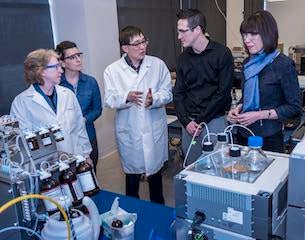ALUMNI | Graduates of growing URI pharmaceutical sciences program being hired by major firms
 It’s only six years old, but the University of Rhode Island’s undergraduate program in pharmaceutical sciences has already made a mark with 100 percent of its graduates employed or in graduate school.
It’s only six years old, but the University of Rhode Island’s undergraduate program in pharmaceutical sciences has already made a mark with 100 percent of its graduates employed or in graduate school.
Launched in 2009 by the College of Pharmacy, the four-year undergraduate program enrolled just 16 students in 2010. Now about 200 students are enrolled in the program. Twenty-nine students graduated on May 17.
The program prepares students for jobs in a wide range of employment sectors: universities, government, hospitals and industries, particularly the pharmaceutical industry.
Extensive efforts have been made to prepare the students with a full spectrum of technical skills and to link them to potential employment opportunities. They are placed in faculty laboratories to immerse them in intensive research experiences.
In addition, Erin Edmonds was recently hired to strengthen the program’s experiential activities and expand partnerships with industry.
An external advisory board was recently formed and includes members from the U.S. Food and Drug Administration and major pharmaceutical companies such as Bristol-Myers Squibb and Pfizer.
Although it is a selective program requiring strong academic skills in science, applications to the program more than doubled from 2013 to 2014.
“Companies like Amgen, Pfizer and Rhodes Pharmaceuticals see URI as providing a high quality program.”
“There is a need for this kind of preparation and the job market is very good,” said Roberta King, a professor of biomedical sciences in the College of Pharmacy and coordinator of the program. “Companies like Amgen, Pfizer and Rhodes Pharmaceuticals see URI as providing a high quality program.”
In fact, three graduates are employed at Pfizer’s Groton, Conn. research facility and three are working at Rhodes Pharmaceuticals in Coventry, R.I, a firm that specializes in controlled substances and technically challenging products.
“Many of our graduates are employed here in Rhode Island and nearby in Connecticut and Massachusetts,” King said. “We also have a graduate employed as a biomedical scientist at the Dana Farber Cancer Institute in Boston and another working as a regulatory compliance coordinator with CVS Health in Woonsocket.”
Bingfang Yan, professor and department chair of biomedical and pharmaceutical sciences, said URI’s reputation in the discipline has been spreading rapidly the last couple of years.
“Because of the quality of the program, company experts are coming to URI and collaborating with faculty to teach several of our classes,” Yan said.
“Our program is often a step ahead in the areas of drug development and drug policy,” he said. “We consistently introduce new material.”
He gave as an example the new area of drug development called biosimilars, which can be viewed as generic versions of biologics, medical products developed from biological sources. In March, the FDA approved the first biosimilar.
“We are ahead of the game,” Yan said, referring to the program’s new course on biologics and biosimilars, which started in January 2015.
“Our faculty are eager to bring the latest research and drug development knowledge to our students,” King said.
MEETING OF MINDS: Officials from Amgen recently toured URI’s College of Pharmacy and met with faculty members from the University’s bachelor of science in pharmaceutical sciences. From left are: Roberta King, URI professor of biomedical sciences and coordinator of the undergraduate program; Erin Edmonds, coordinator of experiential of education for the College of Pharmacy; Bingfang Yan, professor and department chair of biomedical and pharmaceutical sciences; Jimmy Fleming, senior manager of manufacturing at Amgen, a 2003 graduate of URI’s International Engineering Program; Ran Zheng, executive director and plant manager of the company’s West Greenwich plant. URI photo by Michael Salerno Photography.
Media Contact: Dave Lavallee, 401-874-5862
 Home
Home Browse
Browse Close
Close Events
Events Maps
Maps Email
Email Brightspace
Brightspace eCampus
eCampus


